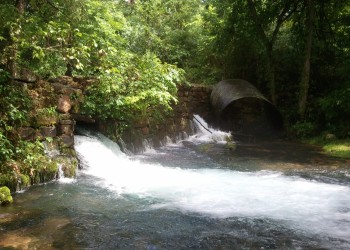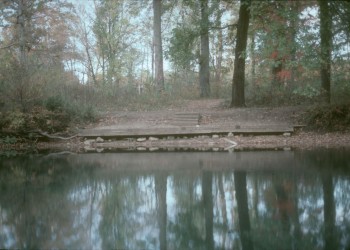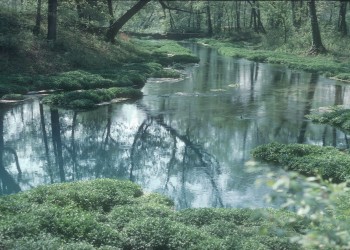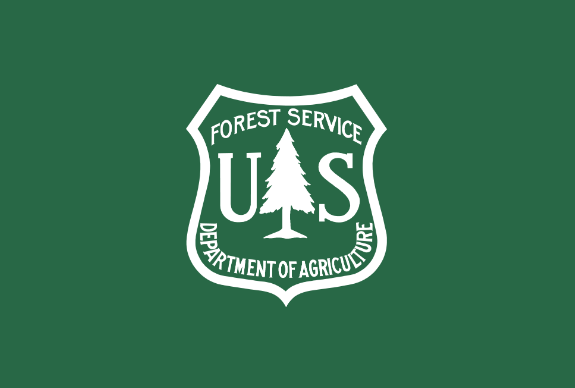Boze Mill Float Camp
Boze Mill Float Camp, located on the Eleven Point National Scenic River, can be accessed from the river or down a short path from a parking area.
Boze Mill Spring forms a sparkling blue pool which produces between 12-14 million gallons of water per day. Aquatic plants add many shades of green to the spring branch. The historical 1880’s turbine and hand-layered rock wall from the Lucas Boze grist mill still exist today. Boze Mill is nestled in a beautiful glen beside the Eleven Point River just above Riverton, and was once an important center of commerce where farmers could get wheat and corn ground into flour. Boze Mill Spring is 423 feet in elevation.
Campground: Primitive dispersed camping is allowed. A vault toilet is centrally located.
Canoeing: This is a popular stopping point for people canoeing on the Eleven Point River.
Fishing: Wade or float fishing for bass, rainbow trout, and pan fish. Wading occurs, but the extremely cold water and swift current may be hazardous.
Travelers by road, park at the trailhead and can walk in to gain river access and picnic. Tables and grills are available. If you are floating into the camp, the access upriver is Whitten (FS), downriver is Riverton East (FS).
Photos of Boze Mill Float Camp
General Information
Camping
There are 3 designated sites, each with a lantern post, picnic table and fire ring.
Primitive Camping with a centrally located vault toilet; primary access is from the river, but there is also walk-in access from County Road 152.
Dispersed camping is the term used for free camping anywhere in the National Forest OUTSIDE of a designated campground.
Dispersed camping means there are no toilets, no structures, no trash cans, no treated water, and no fire grates.
There are extra responsibilities required for this type of camp. It's a must to educate yourself before you try it, but we hope the adventure of dispersed camping in the Mark Twain National Forest calls to you!
- Pick a Campsite and follow the Leave No Trace Principles
- Camp 100 feet away from trails and water sources.
- Treat any water found in the area before consuming it.
- Human waste (Feces) must be buried at least 6 inches deep and covered.
- Pack out all of your garbage.
January - December
Quiet hours are 10:00 p.m. until 6:00 a.m.
When Visiting the Eleven Point Wild and Scenic River
At Access Sites and Camps/Campgrounds:
- No overnight camping in day use areas at any time of year.
- Dogs must be on a 6 foot leash in the day use area
- No trash containers at all sites; please pack out all your trash.
- Fireworks are prohibited.
- Park only in designated parking areas.
- Please don’t damage the historic structures.
On The River
- Follow the Leave No Trace Principles
- No glass or polystyrene on the river.
- The river can rise rapidly, be aware of changing conditions.
At Float Camps and Campgrounds
- Only dead and downed wood for campfires
- No more than 8 people are permitted at single sites
No fees are required for this site
Boating
When boating with your dog, follow all Missouri State boating laws.
- Use care when getting your dog in and out of the boat to ensure their safety.
- Consider both you and your dog wearing a life jacket.
- Provide shade for your pet.
- Remember to bring their food and water as it may be unsafe for them to drink lake water.
Camping
- Keep dogs on a six-foot, or shorter, leash when they are not inside a tent.
- Store dog food in bear-resistant containers and feed your pet away from the campsite.
- Pick up and bag your dog’s waste. Place it in a provided trash receptacle or pack it out.
- Do not leave your dog unattended at any time.
- Keep your dog in your tent at night.
- Ensure that there is ample water available for your pet.
Trail Use
Dogs are allowed on hiking trails, as long as they are kept on a leash. Unleashed dogs can pose a danger to your pet, the natural resources of the area, and other forest visitors.
Wildlife
- Do not allow them to interact with wildlife
Address: #66 Confederate Ridge Road Doniphan, MO 63935
Phone: 573-996-2153
Hours: 8:00 am - 4:30 pm, Monday to Friday; District Offices closed 1 - 1:30 for lunch (Closed on federal holidays)
Office Email: sm.fs.marktwainnf@usda.gov
Getting There
Latitude / Longitude
Latitude: 36.66313889
Longitude: -91.19766666
Elevation
636 ft
Directions
From Riverton:
- go east on Hwy 160,
- turn left/north onto County Road 152 and travel for 2 miles to Boze Mill Spring on your left.
Upon arriving at the site you will need to walk down a short trail to reach the campsites from the parking area.
Parking
5 vehicles
Facility and Amenity Information
Accessibility
The trail to the campground is not accessible, however the lantern posts, picnic tables and fire rings are accessible.
Restrooms
Restrooms are available at this site.
Water
Potable water is not available at this site.
Picnic Tables
Picnic tables are available at this site.
Horse/Pack Animal Information
Horse/Pack animals are not allowed at this site.
Recreation Opportunities
Boating - Motorized Info
The Eleven Point National Wild and Scenic River meanders through the picturesque Ozark hills of southern Missouri. Its course is cut in the shadows of steep bluffs, through sloping forested valleys, and low-lying riparian ecosystems. Barely more than a small stream at its upper reaches near Thomasville, it gains considerable width and depth as its proceeds south-eastward.
The river has been designated for both motorized and non-motorized use.
Boating - Non-Motorized Info
The Eleven Point National Wild and Scenic River meanders through the picturesque Ozark hills of southern Missouri. Its course is cut in the shadows of steep bluffs, through sloping forested valleys, and low-lying riparian ecosystems. Barely more than a small stream at its upper reaches near Thomasville, it gains considerable width and depth as its proceeds south-eastward.
The river has been designated for both motorized and non-motorized use.
Fishing - River/Stream Info
Fishing the Eleven Point Wild and Scenic River is a very popular recreation activity on the Mark Twain National Forest.
The river sees a variety of users and is shared by canoes and boats, swimmers, trappers, and anglers. Please use caution and courtesy when encountering another user.
Be aware that 25 horsepower is the maximum boat motor size allowed on the Eleven Point River from Thomasville to "the Narrows" at Missouri State Highway 142.
The Varied Waters
Different fish live in different parts of the river depending upon the water temperature and available habitat.
- The upper river, from Thomasville to the Greer Spring Branch, is good for smallmouth bass, longear sunfish, bluegill, goggle-eye (rock bass), suckers, and a few largemouth bass. This area of the river is warmer and its flow decreases during the summer.
- The river and fish communities change where Greer Spring Branch enters the river. The spring more than doubles the volume of the river, adding millions of gallons of clear, cold spring water each day. This cold water makes it possible for Rainbow Trout to do well in this part of the river. Five and one-half (5-1/2) miles of river between the Greer Spring Branch and Turner Mill South Access is a Blue Ribbon Trout Area (BRTA).
- From Turner Mill to Riverton the water stays cold and is managed as a White Ribbon Trout Area (WRTA). Twelve inch (average) trout are stocked in the WRTA by the Missouri Department of Conservation from March to October. From Greer to the Arkansas state line you will also find numerous smallmouth bass, goggle-eye, suckers, longear sunfish, chain pickerel (pike) and an occasional walleye.
Baits and Tackle
Fish in the Eleven Point River are caught with a wide variety of tackle and with various baits. Worms, salmon eggs, cheese, canned corn, plugs, soft plastic lures, hard lures, grasshoppers, and artificial flies have all been used for fishing. Other types of live bait may be used for fishing.
When using live bait, special rules, limits, and capture methods also apply. Game fish or their parts may not be used as bait. In the BRTA, only flies and artificial lures may be used. Natural bait, scented bait, and soft plastic cannot be used in this area. Fish gigging is also prohibited in the BRTA.
Gigging
Gigging for fish is a time honored activity in the Ozarks that dates back to a time when good fishing equipment was not available. Hand made gigs for fishing are still made today. Suckers are the fish most often gigged. Gigging has certain seasons and limits. Some areas are also closed to gigging year round. Consult the latest copy of the Wildlife Code of Missouri if you wish to try your hand with this specialized type of fishing
Rules and Regulations
To protect and manage Missouri's fine fish populations, rules and regulations (the Wildlife Code of Missouri) have been enacted to insure that future generations will be able to enjoy the outdoor world. However, be aware that regulations may change each year. To prevent illegal fishing practices and possible citations, review and study the latest fish and game regulations published by the Missouri Department of Conservation.
MDOC Special Waterbody Regulations for the Eleven Point River (html)
MDOC Fishing Prospects for the Eleven Point River (html)
Fishing Mode
Canoe, kayak, wading
Fish Species
Fish Species - Daily Limits - Minimum Size in inches
- Largemouth (Black Bass) 6* 12"
- Smallmouth (Black Bass) 1* 15”
- Sunfish (Longear and bluegill) 50 none
- Rock Bass (Goggle-eye) 15 8”
- Suckers 50** none
- Drum 50** none
- Walleye and Sauger 4 18”
- Chain Pickerel (Pike) 6 none
- Rainbow Trout (White Ribbon Trout Area) 4 none
- Rainbow Trout (in Blue Ribbon Trout Area) 1 18"
* you may take a total of 6 Black Bass daily, but only one may be a Smallmouth Bass ** the limits are 20 fish total while gigging
Water Temperature
30 - 65 Degrees
Fishing Method
Rod & /Reel, Flyfishing
Water/Flow Level
varies w/ rainfall
Picnicking - Single Info
You can picnic at the campsites when they are not in use.
Recreation Groups
The Eleven Point National Wild and Scenic River meanders through the picturesque Ozark hills of southern Missouri.











